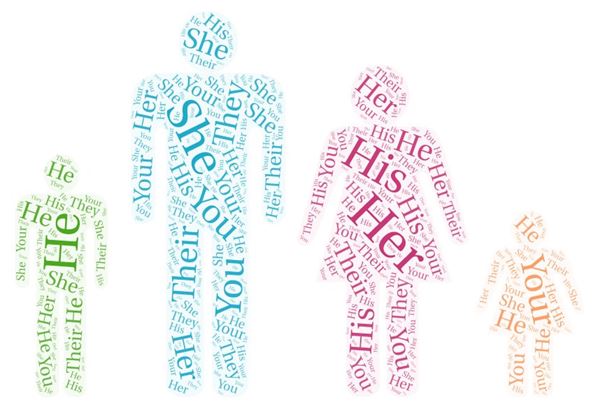The first time I saw a cisgender person display their pronouns with she/her on their Instagram biography, I was utterly confused and disappointed in them. This was someone who was known to be socially conscious and politically correct.
I remember my first thought was, “Isn’t that problematic? Is it really in her right to say her pronouns when she is visibly and openly cisgender?” This just goes to show how little I understood gender expression, gender identity and the whole idea of pronouns at the time.
https://twitter.com/piinofs/status/1174543853115838464
We are living in a time where the Merriam-Webster Dictionary added “they” as a singular pronoun, even though it is debated whether or not it is grammatically correct in many college English departments.
Although there are disagreements about its uses, there is growing acceptance for gender expression and identity that is finally being implemented into larger institutions. Many of my professors are asking students what their pronouns are and if they would like to be called by a different name. However, even with representation and more awareness, there is still an overwhelming amount of violence and prejudice toward transgender and gender non-conforming people.
For the past week I have had the privilege of educating the nurses in one of the busiest Emergency Departments in Atlanta about the importance of assessing for, and using, preferred pronouns when caring for Trans and Gender non-conforming patients. *thread* pic.twitter.com/XlMxMZJMaA
— Tsunade Senju’s Apprentice, RN (@MyLifeAsDnic) August 19, 2019
As of Sept. 13, the Human Rights Campaign recorded 19 deaths of trans women caused by fatal violence so far this year. According to the Centers for Disease Control and Prevention (CDC), the life expectancy of transgender women is 35 years old.
There are high rates of disproportional violence towards transgender women of color, with many other intersectional factors being to these rates (racism, homophobia, sexism and transphobia). According to the CDC, although there is a growing acceptance of gender expression and identity, there is still a high rate of discriminatory action toward transgender and gender non-conforming people.
Some of us may fall into the trap of transphobic thinking without even realizing it. For example, I was at the mall and I overheard a group of girls discussing whether or not a person in the distance was a man or a woman. This is inherently transphobic and no one can ever conclude what someone identifies as unless they tell you.
to any cis people reading this: you may not think it, but referring to people as they/them when you don't know their pronouns is absolutely wonderful and very important. it helps normalize these pronouns, while also showing the importance of respecting someone's gender. obviously
— Loki 🐢 (@thunderfitz) September 19, 2019
We have to collectively change how we perceive gender expression and gender identity. We have to unlearn that gender expression does not equate to gender identity and that sex does not equate to gender. It is time that we start participating and finding ways to help our transgender and gender non-conforming friends.
By actively participating in a cultural shift of accepting pronouns and normalizing them, we can help create a more inclusive society where transgender and gender non-conforming people not only feel safe, but are safe. A small but impactful thing we can all start doing is sharing our pronouns.
Wherever and whenever you can, including email signatures or social media biographies, use your pronouns. Doing this creates a respectful space for transgender and gender non-conforming people while also not “outing” themselves when introducing their pronouns.
In terms of donating and supporting organizations that can help with injustice toward transgender people, consider the American Civil Liberties Union, which helps defend and protect the rights of many minority groups in the United States.



